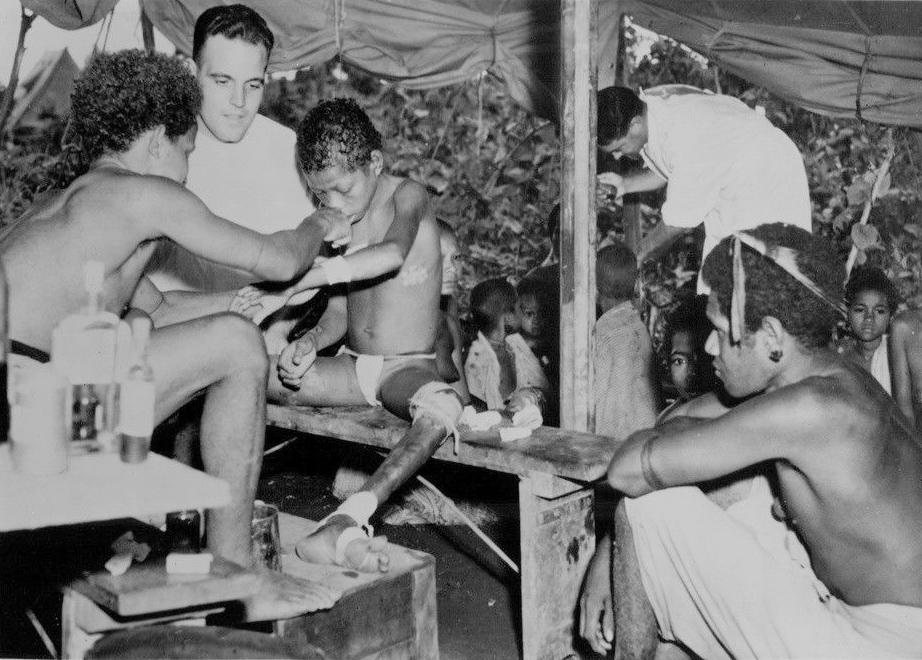
World War II New Guinea Campaign: Native Relations with the Allies--Correct Behavior

Figure 1.--A strong bond was forged between Australian combat troops and New Guinea natives on the Kokoda Trail. That bond grew and was strengthened with the Australians and Americans as the New Guinea campain unfolded. Here we see Australian medical personnel probably in 1943 giving New Guinea native children a class on basic medical care.
|
|
It was not just the stuff that Australians and Americans had that won the New Guinea natives over, it was their correct behavior. The Allied soldiers, like the Australian officials and missionaries before the War, generally behaved in a correct honorable fashion. They did not steal food from he natives. Nor did they rape the omen. Violent incidents were very rare. There are also reports of mistreating women. But ghe main problem was food. Hungary Japanese soldiers seized native food. New Guinea was not a food exporting colony. It was self suffient in food, but did not produce a surplus. The natives basically practiced subsistence agriculture. There was no substantial surplus and certainly no way of feeding tens of thousands of Japanese soldiers. But this is just what Japanese occupation polices expected. It was possible in areas with developed agricultre producing food for export not for tens of heavily armed and hungary Japanese soldiers. The commanders at first ied to enfiorce a no fraternization policy. But hungary, armd soldiers were going to go after food. And if th natives resisted, they wre hot. The Allies in contrast had plenty of food thy brought their food with them. And were willing to share it with their New Guinea native vounteers and not uncommonky friendly villages. Allied soldiers were also willing to barter. And had lots to offer. There were no forced exchanges. The Allies had something else to offer--modern medicine. And hey made medical care available to the natives. This made a real diffeence in the lives of people used to shamans and whitch doctors. We even notice Allied medical personnel training natives in basic health practives.
CIH -- WW II

Navigate the CIH World War II Section:
[Return to Main New Guinea native relations with the Allies]
[Return to Main World War II Pacific New Guinea native page ]
[Return to Main World War II Pacific New Guinea page ]
[Return to Main World War II Pacific island territory page ]
[Return to Main World War II island territory page ]
[Return to Main World War II country page ]
[Biographies]
[Campaigns]
[Children]
[Countries]
[Deciding factors]
[Diplomacy]
[Geo-political crisis]
[Economics]
[Home front]
[Intelligence]
[POWs]
[Resistance]
[Race]
[Refugees]
[Technology]
[Totalitarian powers]
[Bibliographies]
[Contributions]
[FAQs]
[Images]
[Links]
[Registration]
[Tools]
[Return to Main World War II page]
[Return to Main war essay page]
[Return to CIH Home page]
Created: 6:51 AM 7/21/2018
Last updatd: 6:51 AM 7/21/2018



